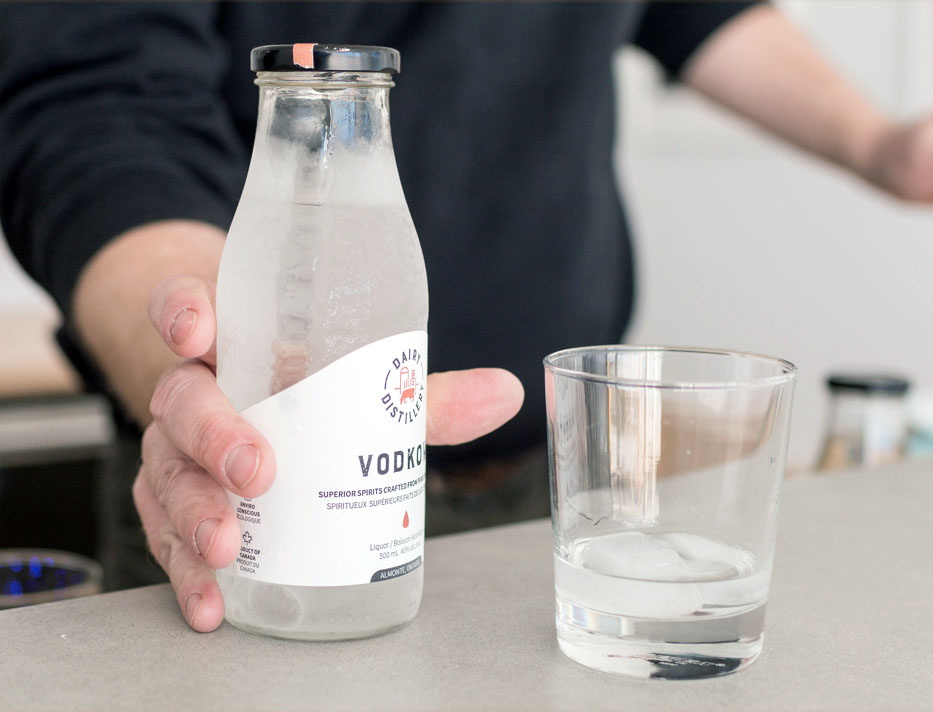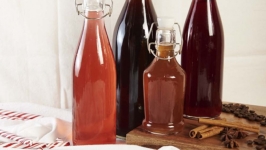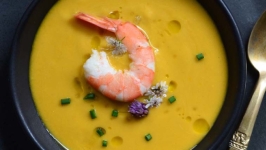The Spirit of Ontario Dairy
My Falstaffian friend sits across the table and inhales deeply from the glass before sipping and sitting back to let his much-traveled palate begin its work.
“Hmmm. Yes,” he says. “It’s closer to vodka than anything else, though its flavour is a bit more distinct than most vodkas — and there’s no harshness at all.”
Mind you, he adds, each sip begins with a slight buttermilky sourness — a nice sourness that is soon transmuted into a long, sweet aftertaste.
He sips again. “It has the mouthfeel of a liqueur. Really nice stuff.”
He compares it with a sip of Stolichnaya, close at hand. “I like it every bit as much. The Stoli begins a bit fuller, a bit more herbaceous — but this stuff finishes better. I’d buy it. I’d drink it with just a little ice.”
The libation so heralded is known as Vodkow, made by Dairy Distillery, a new artisanal distillery in Almonte. The name fits, since the alcohol in Vodkow is distilled from lactose, a milk sugar.
My friend laughs. “Okay, a good name — but any self-respecting distillery that produces Vodkow should be named Smoonoff,” he says. With this display of oppressive brilliance, I knew it was time to put the tipple down.
The eureka moment
The Dairy Distillery in Almonte is the brainchild of two close friends, Omid McDonald and Neal McCarten. Really, they’re a bit more than friends, since McCarten is a cousin of McDonald’s wife.
McDonald, now CEO, has been technically minded all his life. At 18, he developed a computer program to help doctors trace fetal heart rates. Later, he worked for two years in Paris to develop a procedure for backing up phonebooks on to cellphones — “another fun adventure,” he now says.
Early on, he became interested in distilling. As a child on holiday in South Carolina with his family, he checked out a distillery that left a still vivid impression. “There was beauty in everything — in the copper equipment, the building itself. I was hooked.”
He began taking courses on distilling, including a four-day workshop at a Chicago-based distillery that actually sells stills. “That was my basic introduction,” he says.
His “aha” moment came much later when he was speaking with his friend and in-law, McCarten, now the company’s operations officer. He learned from McCarten, whose uncle is a dairy farmer, that a lot of skim milk was being dumped because of excess production.
If McDonald wanted to start a distillery of any kind, that skim milk might provide lactose, a milk sugar that could be used in the distilling process.
“And then Omid got that glimmer in his eye,” McCarten recalls. “He started getting the wheels in motion and asked me if I wanted to go in with him on a distillery.”
They soon learned that dumping skim milk happened rarely, not often enough to provide them with the quantity of sugar they’d need. They’d have to find a more reliable source — and McDonald began cold-calling processors to see what he could line up.
“And it was all pretty fortuitous,” McDonald now says. “I found a lady at the Parmalat in Winchester who told me they were turning on an ultra-filtered milk factory and would have lots of milk permeate to offer.” Permeate was a perfect source — essentially, only lactose and water, with a few minerals tucked in.
Milk sugar has been used for many centuries in making alcoholic drinks. More than 1,000 years ago, the Mongols used mare’s milk to make kumis, their signature alcoholic beverage. And many current producers derive milk sugar from whey, a byproduct of cheesemaking. But only the Dairy Distillery, as far as McDonald knows, is deriving milk sugar from permeate.
Of course, they had to think about a marketing plan — and they soon had another “aha” moment. On reflection, using permeate would be great for marketing. First, buying permeate would put a little money in the pockets of dairy farmers, recently smacked by Canadian concessions in trade negotiations with the United States. Second, using permeate instead of dumping it would spare the environment. And third, the idea of building a new drink on milk sugar was novel enough to intrigue consumers facing near-infinite choices at the liquor store.
Their final marketing message? “We craft great spirits that do good.”
Fine. But would permeate produce a drinkable drink? Could its milk sugars work well with conventional brewing yeast?
The men presented their problem to the University of Ottawa biology department, where professor Alexandre Poulain and graduate student Jessica Gaudet, over many months of work, solved the yeast and fermentation dilemma.
First, Poulain had to find a yeast that would ferment the sugar in permeate. This yeast had to have a complicated structure that could work in the absence of oxygen, unlike simpler yeasts used to ferment beer.
As noted in a University of Ottawa account of the work, Poulain experimented with a dozen commercial yeasts before finding one with the requisite qualities.
The distillers then hired Gaudet as a lab intern, to find optimal conditions for fermentation on a commercial scale. After hundreds of experiments, she produced an initial sample that, once tested by the LCBO, passed muster as a safe spirit for sale. In later work, she found ways of scaling up the process for 2,000-litre vats.
The scientists' work was crucial. As McCarten notes, “Without Alexandre and Jessica, we just wouldn’t have gotten where we are.”
Build it and they will come
Almonte seemed a natural place to build. “The place has a real pull,” says McCarten, who, like McDonald, lives in Ottawa.
“There’s so many great festivals in summer, there’s a great sense of community and it’s kind of a foodie place. We would fit in.”
They first considered buying a disused church — which, for these jokers, brought up thoughts of having a drink named Holy Cow. But the structure wasn’t quite what they needed and their thoughts turned to building from scratch.
“And Omid liked that idea,” McCarten recalls. “He’d say, ‘Let’s build something really nice, something that could be here in a 100 years — a great place to come and work every day.’”
They found a two-acre site on Industrial Drive and began construction a year ago. When they’d finished, they had what their website describes as “a perfect union of agricultural and contemporary design… a stunning workplace for the crafting of fine spirits.” Through an all-glass façade, visitors can see the Christian Carl copper stills from Germany, an impressive sight at night.
Now it came down to the hooch. Would it be any good?
“All I can say is, for me, it’s amazing,” McDonald says. “There’s a slight sweetness, and then, when you first swallow, the heat of vodka. And then there’s a great finish — a bit caramelly for me, but some people speak of ice cream. You want to keep on sipping.”
Okay. McDonald has a horse in this race. But what about more neutral tasters?
“Well, we’ve had tastings with 38 people in the restaurant business, comparing Vodkow with more established brands. And many have preferred our product.”
Dustin Therrien, owner of the Cheshire Cat Pub in Carp, was one of the early samplers.
“I can only call Vodkow an amazing product,” he says. “There was a creamy viscous mouthfeel, a nice long lingering mellow finish and a lot of refinement overall. These guys are just really on point.”
McDonald and McCarten produced an initial 1,000 bottles, which they thought would cover sales up to the end of the Christmas holidays. But after they started selling in early November, the bottles flew out of the premises. Within 10 days, all the stock was gone. Which, in some ways, is a nice problem to have.
Of course, they’ve replenished. You can now buy Vodkow at $25 per 500-ml bottle, or $36 per 750-ml bottle. A 12-bottle case of 750-ml bottles costs $432.
If you build it, they’ll come. Sometimes. And they have been coming.
But the Dairy Distillery is still building a reputation, a clientele, and a distribution network.
They’ve just ordered a second still that, given the shining early signs, will allow them to quadruple capacity.
People are coming in for tours of the premises. “And we’re more than happy to show anyone what we’re up to,” McDonald says.
They’ve applied to join an LCBO program that would see their product sold in 25 liquor outlets. Their hope is to be on shelves by March.
By next summer, they expect to boost their staff strength from three to 10. And they’re working on a cream liqueur that will have only one ingredient besides alcohol — milk, of course.
They even think they may soon be able to call themselves producers of real vodka, a category that, in Canada, is currently limited to products distilled from grain and potato sugars. (The category is far more open in the U.S. and in Europe.) Ottawa has just announced that a new definition of vodka will include other sources of sugar.
The trajectory, at this point, is all they could want.
Will the consumer world ultimately prove hot or cold? They have well-grounded hopes, but there are never any guarantees. Still, they say they’re in it for the long haul. And if the heat of success proves a bit slow in arriving, they can always retire to a corner with a bottle of Vodkow.
“It’s warm, you know,” McDonald says. “No burn at all — but a nice smooth warmth.”
Dairy Distillery
34 Industrial Dr., Almonte, Ont.
dairydistillery.com | 613.256.6136 | @dairydistillery













